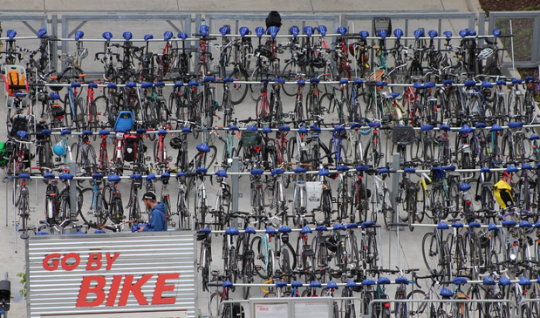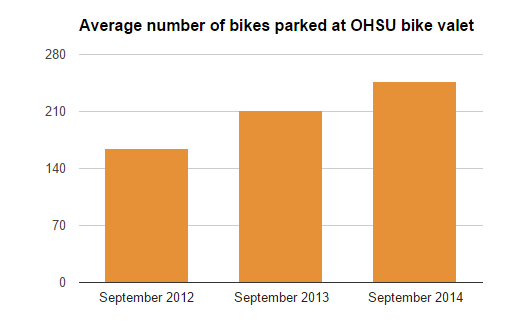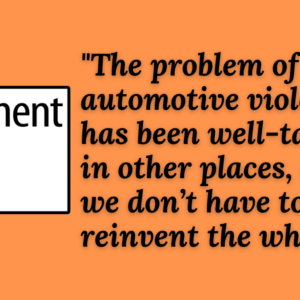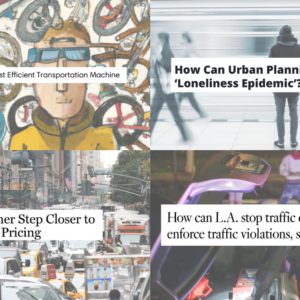
(Photo: Go By Bike)
Part of our series of guest posts, America’s Next Bicycle Capital, where we share community voices about the future of biking in Portland. This week’s guest writer is Kiel Johnson, owner of the Go By Bike shop and operator of the Go By Bike valet.
__
Repeat after me: it is not your fault your bike got stolen. Even if you were a dummy and left your custom bike unlocked only to return several hours later and find it stolen, it is not your fault.
The solution to ending bike theft is easy. It starts with this fact: we are already dealing as individuals with the costs of theft.
Most of us are accustomed to occasionally replacing a lost light, a stolen seat, and in many cases a whole bike. To truly solve bike theft, all we have to do is cover those costs as a society — in the form of secure bike parking.
The problem, in other words, is that we have not externalized the cost of secure bike parking.
We need to create secure bike parking that takes into account the realities of parking a bike. Everyone sometimes forgets their lock and it is impossible to theft proof all the components on a bicycle.
I am fortunate enough to work for a place that provides secure bike parking and has externalized these costs. At Oregon Health and Science University you don’t have to carry a clunky lock. Your lights remain on your bike and you don’t have to lug your bags and helmets around wherever you go. Over the past 2.5 years, people have parked their bike over 100,000 times at the bike valet I operate. Every single time, they got their bike back.
Having zero risk of your bike being stolen, as well as the social benefits and practicality of the bike valet, has created a huge spike in bike commuting to OHSU. After the first year, we had a 25 percent increase in valet users and after the second an increase of 35 percent.
The year before the bike valet opened, in the peak of summer, there were 202 bikes in the plaza around the tram. This past summer, with the addition of the bike valet, there were over 500.
At the risk of their own demise, anti-density activists and bike-unfriendly businesses are resisting a crucial fact: Car parking is expensive and bike parking is cheap. OHSU understands this. Even when you pay someone to watch over your bike, guaranteeing 100 percent security it is still much cheaper. In 2013, the Lloyd Center Mall paid $3,354,000 in property taxes for about 33 acres of central Portland, 16 of which are dedicated to car parking. Finding ways to get some of those people parking their bike instead of a car and transforming that space into retail would mean big money.
The bike theft problem is only going to get worse if we continue to ignore it. If you ride in Amsterdam you have a 13 percent chance of having your bike stolen every year. Here in North America, the most depressing fact about bike theft is that 7 percent of victims never replace their bikes.
Advertisement
What is the social cost of having those victims stop riding their bicycles? What is the cost of replacing over $2 million of reported stolen bikes in Portland, plus all the bikes that aren’t reported every year? Right now the victims and society are internalizing all these costs. If we know more bikes create value for society, we need to externalize those costs.
When I buy a bike, I should pay a small one-time registration fee, maybe $10 or $20, based on the estimated amount saved from bike thefts prevented the previous year.
One idea for how this could work comes from listening to what local gadfly Terry Parker has been saying for years. When I buy a bike, I should pay a small one-time registration fee, maybe $10 or $20. This fee would be based on the estimated amount saved from bike thefts prevented the previous year.
And I propose that when an individual buys a bike in Portland, the bike also comes registered. Registering bikes allows for police to flag used bikes as stolen prior to an individual buying it. The money from the fee would help pay for something that would benefit all bike users: a lot more secure bike parking. Here are some ideas of what could be incentivized:
- Bike parking with cameras and signs that state the presence of cameras
- Fenced bike parking
- Security guards or small bike valets at grocery stores and popular nightclubs
- Centrally located bike valets (like at transit hubs or big shopping centers)
- Bike checks to go alongside coat and bag checks with signs alerting people to what businesses provide this service
- An inexpensive long-term city bike loan fleet to reduce the incentive to steal a bike
None of this will happen if we keep blaming ourselves when our bikes get stolen. Bike theft is a huge problem and a massive deterrent against more people riding. Having fewer people riding bikes is bad for everyone.
We talk about safe street infrastructure like it is the only barrier to riding a bike, but it is not. And infrastructure is really expensive. To solve the social and practicality barriers that prevent people from riding a bicycle, we need to externalize the costs. A bike that is stolen and deters someone from riding more is not the fault of the rider, but of a society that has not taken into account the cost we all pay if that person takes their next trip in a car.
If you’d like to add your voice to this series, get in touch via email: michael@bikeportland.org.










Thanks for reading.
BikePortland has served this community with independent community journalism since 2005. We rely on subscriptions from readers like you to survive. Your financial support is vital in keeping this valuable resource alive and well.
Please subscribe today to strengthen and expand our work.
Kiel Johnson for Mayor!
Interesting and broad thinking story, thank you
“Repeat after me: it is not your fault your bike got stolen. Even if you were a dummy and left your custom bike unlocked only to return several hours later and find it stolen, it is not your fault.” Thank you, Kiel.
I almost stopped reading after that opener, which with I will never agree. Glad I continued reading, as there are some interesting ideas.
The note about property taxes on parking acreage in the Lloyd is especially eye opening. We need more big picture thinking and analysis like this. Thank you for the perspective.
Also? That first photo is really cool.
I love the bike valet concept, though I suspect it is already being used in places where there are enough bikes to support it (the funnelling effect of the tram; Timbers games). I’d be interested to see if having bike valet at the Moda Center would result in more people biking to Blazers games.
However, I’m not a fan of what would amount to a big tax on new bikes. Let people figure out how to protect their bikes, and decide for themselves the trade. It’s not like the free market is magic and fills every need with perfect efficiency. But top-down approaches generally do worse.
In 2009 I bought a bicycle while visiting Portland and had it sent back to the East Coast where I live, why should I pay an extra 20 bucks to register the bicycle in a state (Oregon) where I’ll likely never ride it?
I imagine that something like the sales tax exemption the Washington allows to Oregon buyers might be included in a program like this. It hardly seems like a deal breaker.
Consider it sales tax!
My opinion is that employers, businesses, and organizers of bike events should take more responsibility for the safe keeping of parked bikes. At one of last year’s Bike Commute Challenge team captain events, our captain’s bike (locked by a cable lock right outside the store hosting the event) was stolen. I wrote to BTA, the host of the event, and suggested they should have provided some security (as they have for other events), for example a temporary bike corral, stewards, etc. They soundly rejected taking any responsibility.
If you are responsible for a business or organization that employs or involves bicyclists, I’d suggest it is in your economic interest to provide a safe and secure environment for bikes. That’s one reason I frequently shop at bike shops that welcome you to park your bike in the shop.
But some believe that it’s not the fault of the employer, business, organizer or owner if a bike is stolen.
The first bike I had stolen was registered in the town where I bought it and where it was stolen. Registration did not result in its recovery. That said, for one-time fee of $10 per bike, I’d consider registering it, but then again, I’m OK with blinky lights and high-visibility clothing. Oh, yeah, and I wear a helmet and even stop at the unnecessary stop signs in Ladd’s Addition.
I like the idea.
A small tax on tire purchases could also be used for this concept. That way you always have an additional revenue source being generated, along with the sale of bikes.
Myself, I would be more than willing to pay $25 a year for my bike if it benefited the system as a whole.
Sales tax are a PITA for Oregon retailers.
You now have to change point of sale systems to collect the tax.
The stores now have to take the time to administer the tax.
The state has to create the process to collect and manage the funds generated by the tax. And we all know how efficient govt is with our money.
Small initiatives like this cost more money to manage than they generate.
My boyfriend is self employed and working for a week in Old Town. There is no indoor bike parking at the building and he is too afraid to park his bike outside for fear of parts or the whole bike being stolen. Public transit in our neighborhood is terrible(over an hour to downtown even though it’s 5 miles away) so he’s driving all week. There’s no way to know how many people this is a reality but I’m sure he’s not the only one.
Totally legitimate concerns, but here’s a couple tips. 1. Buy a beater bike. Less likely to be stolen, and much less painful when it does. Even in inflated Portland $150 buys a pretty decent bike.
2. The racks in front of OPS (2nd b/t 3rd and Everett) are pretty safe. There’s security inside and cameras. I’ve seen the same decent bikes parked outside on a regular basis for years.
you can buy a pretty decent stolen bike for $150
He could even lock it up in front of the police precinct or courthouse, and then hop on the bus and ride it through the bus mall down to oldtown (or walk it.
You’d think locking it up in front of the courthouse would be safe….
http://bikeportland.org/2013/04/15/custom-touring-bike-stolen-in-front-of-county-courthouse-85478
My wife was forced to walk to work when she worked in old town, she was pissed, a ten minute easy bike-ride was replaced with a 50 minute walk. all because old town is tweaker central and no property is safe down there.
A classmate from Israel (while at the U of O) used to ride his bike to school and leave it unlocked while inside, sometimes for hours at a time. I was shocked when I noticed and asked if he was afraid it would get stolen. He said he been doing this since moving to the states, and gets one or two bikes stolen per year. He replaces with a cheap, used bike. For him, it was worth the idea of living in a place where you could lave you bike unlocked, even though he was repeatedly, though infrequently, proven wrong. I have never been able to go this route (I am too attached my bikes), but I have always valued that perspective and I think about it frequently.
Thanks for your perspective. We need to stop thinking of bike infrastructure as something that only a few forward-thinking companies (like OHSU) will pay for after they do a cost/benefit analysis. As you stated, bike theft is a significant deterrent to riding, and fewer bike riders should be a concern to the community as a whole. Having some secure bike parking at least as an option in the central city sounds to me like the best approach I’ve heard to addressing rampant bike theft. I don’t see it being too “top-down” to at least have some options for leaving your bike in high-theft corridors and having a reasonable expectation you’ll get your bike back. You have my $20 should it come to a vote.
I would happily pay a one-time flat fee when I purchase a new bike if it paid for world-class bike infrastructure and parking. It can even be just a sales tax on the bike receipt so the buyer wouldn’t even know.
Another solution to this problem is a city-wide bike share program. Many people who want to bike but are afraid of theft would use it, since you never have to worry about the bike being stolen.
It’s important I think to keep things realistic and in perspective. Dreaming is wonderful but at some point the rubber hits the road.
I say that only because while these ideas sound great in principle, they are almost certainly completely unrealistic.
OHSU is not a company, it’s a public entity. To compare what it does with its tax-free infrastructure to Lloyd Center is apples to oranges. And Lloyd Center as an example is not a very good one unless you think people are going to go shopping at the mall and carry home their purchases by bike. Of course, some will, but most will not. very different from a commuter.
A hat/coat check room is nothing like what would be required to have a bike check. Now we’re comparing apples to rutabagas.
A $10 per bike one-time registration fee would, I suspect, not even cover the costs of establishing and maintaining the registration database. Bike valets with (paid) valet attendants around town? Security guards? All fine ideas but the registration fee will do nothing to incentivize this. That’s a drop in the ocean.
A registration database isn’t static–it has to be constantly refreshed and updated. The only way this would work is with an annual licensing program that tracks vehicles as they are sold and resold, retired, or moved out of state. Are you ready for this? And keep in mind a large part of the licensing cost will go to the system itself–there will be little left over to spend on these other amenities.
Finally, does anyone believe people steal bikes in order to ride them? Or do they steal them to resell them? If the latter, then a bike loaner fleet from the city will do nothing to reduce the frequency of bike theft. Might be good for other reasons, but not to deter theft.
The more constructive ideas appear in the Nick Fish thread–figure out how to educate bicyclists about how to properly lock their bike, and encourage businesses, via educational programs, hectoring, or perhaps regulations, to install more secure bike parking.
All very good and solid points!
I agree, The fees definitely wouldn’t cover registration costs, record maintenance, label production, and/or the mentioned labor costs. Though I also realize that the city isn’t in the business of making money, they are a service provider at a basic level so it’s not out of the question even if costs the money
Personally, I think the whole preventing bike theft is similar to Don Quixote and his windmills. Cameras, staff, highly trained security (both uniformed and undercover) etc doesn’t stop shoplifters which is a much larger black market economy than bike theft.
I doubt a little paper work and a couple bucks out of pocket are going to stop or even slow the problem? If anything I suspect that all this publicity on how easy it is to get away with stealing bikes is likely make the problems worse.
Wait, where did Kiel’s #1 suggestion – City provision/subsidy of secure bike parking – go in your comment? The City provides copious parking for motor vehicles at great expense. I’d estimate that somewhere between 30 and 45 percent of the City-owned pavement in our city is parking lanes – paving those lanes is not cheap. Given the information provided by Kiel in his article, it appears that secure bike parking has an extremely high cost-benefit ratio and would be a great investment by the City to at least provide equity (in proportion to mode share) with our already-huge investment in motor vehicle parking.
Correction, I meant “fairness” not equity – although given that bike riders are disproportionately poor, City provision secure bike parking would be a pro-equity measure as well.
The Lloyd TMA has 30 bike lockers in a parking lot behind the tower at 9th & Multnomah, in a space that’s only big enough for 3 or 4 cars.
Yes, bike lockers are bigger than staples, but much smaller than car spots.
OHSU is not a company, it’s a public entity.
Actually it is both.
At this point, I would just like more covered parking.
I think the OHSU bike valet is awesome, but I still want to keep my bike covered as much as possible (as nice as a seat cover is).
From what I have been told, if your bicycle is stolen in Copenhagen, its insanely simple to get reimbursed so you can get a new bike. This is a bit of an exaggeration but my friend who lives there says you basically go online and fill out a form and then walk over to the bike shop for a new ride. Theft happens and it has a cost, sure. If we accept that we are going to try to internalize some of that cost through some kind of fee, I’d rather pay into an insurance/risk management pool that makes it brainlessly simply and easy to get $ for a new bike rather than a “more locks on the door” scheme.
OHSU charges its employees $13 per day to park so there is extra incentive to ride your bike if you work up on the hill. Those of us who work 12 hour shifts up there can’t take advantage of the valet so it is either pay the money or commute by bike which, by the way, isn’t too much fun after a 12 hour shift
OHSU also incentivizes biking by paying $20/20 days commuting (used to be more $50/30).
But yes, the 12 hour shifts are problematic
How much does OHSU pay to provide the “free” bike valet service?
I love the bike valet. It’s one of those things that makes Portland stand out. I admit that I am a little concerned that bragging about no thefts is, in a way, like issuing a challenge.
It also doesn’t operate overnight or on the weekends (which can be high times for thieving).
In vietnam whatever business I go to there are bike/motorscooter valets. I don’t have to carry a lock and the bike is always watched in a secure spot. At first, I didn’t trust it totally, but after being here a year and a half and using it, I never carry a lock anymore.
there has never been a bike stolen during a Cycle Oregon ride!
That’s not true. The year before last, I distinctly remember waking to hear several riders had their bikes stolen. Bike gallery and trek were able to help them with replacement bikes so they could finish the ride.
Thank you, Kiel, for pushing the bike theft conversation out of the box a little bit. I hope you’ll forgive me for a pulling it back in slightly…
I read your analysis of the bike parking/bike theft issue as this: public bike parking is cheap (too cheap, actually) and bike theft is an expensive problem. Progressive businesses, residential buildings, and public and private institutions are internalizing the cost of theft prevention by providing end-of-trip facilities that are much more secure than traditional, municipal bike parking.
Where I have to disagree is your strategy for “externalizing” the cost of a better public bicycle parking system. Rather than forcing retailers to implement a tax on bicycle products and placing the cost solely on bike shop customers, we should look to broader, city- or region-wide systems to increase funding for better parking infrastructure. After all, better bike parking is better for everyone, right?
The good news is that we have a well-worn model we can learn from — car parking. The city already owns car parking structures (aka Smart Park) that could be improved to add end-of-trip bicycle facilities (a la BikeStation or the TriMet Bike & Ride). Smart Park car garages work fairly well because the user cost is kept low (perhaps too low) and the supply is more convenient to access than on-street parking. PBOT could create a network of similar bike parking facilities, starting with first floor spaces inside the current Smart Park garages. (For the record, all credit for this idea belongs to Todd Boulanger who brought this up at the Bike Theft Summit.) These facilities could be staffed and/or utilize secure access control systems. Independent operators could be allowed to bid for the contract to administer the stations and provide additional services to generate revenue. Sound familiar?
But how to fund it? The shared benefits of encouraging and supporting bicycle ridership are well understood on this site, so it should come as no surprise to suggest funding this with our public dollars. Public money built the Smart Park garages we have today. Let’s do the same for bicycling. Should there be a cost to the user? Sure, in so long as demand warrants it. But it should be similar to Bike Share where you can buy an annual membership for a low rate, and daily rates are available for occasional users and tourists. Annual memberships could then be subsidized by small to medium size employers without the space to create their own bike parking facilities.
Just like what we’re seeing with roadway infrastructure, our goals for supporting bicycle ridership are no longer such a cheap date. It’s time for our public spending to reflect our goals and aspirations for a more livable city — and, yes, that includes better bike parking.
I appreciate this reminder that it’s not your fault if your bike is stolen. And, while I see its practicality, I always hate hearing the suggestion that you should get a beater bike, or uglify your nice bike so that thieves won’t target you. Can you imagine telling car owners that? “Look, I know you like your BMW, but really, they’re a big target for car thieves. So why don’t you leave it at home and get a second car, some old klunker to drive around? Or, if you really want to drive your nice car, you could bang it up with a tire iron some, maybe spray some primer on it- that way it will still drive nicely, but thieves won’t know it’s a valuable car.” Plus, thieves steal crappy bikes too.
hmm, still not fair b/c people who don’t want the service will be forced to help pay for it. What about co-op bike parking lots? For example, take the Old Town/Chinatown Max station — the person who wants it the most works w/ land owners in the area (sells the idea) to let us use 30’x30′ area for certain hours a day, fence it w/ something or other, and co-op members split up the time being attendants or hiring them. Co-op members vet new members, who have to pay for their own background checks as cost to join. then you just buy coat-check style tickets and there you go. Open it for 6 months as a pilot project to work out all the issues, get the process down and then promote for other co-op groups. Grant guest access between co-ops. Maybe charge $2 for non-members or something, which goes to the attendee. It grows organically and in a few years you have attended bike parking lots where they are needed the most.
I also appreciate the creative thinking here, Keil!
This made me wonder about what it would take to get Smart Park (or other parking companies) into the bike valet business. They get $12-20 per day from a single car spot. Seems like a few spots and, say, $1 or $2 per bike could provide equivalent revenue.
I did not see the phrase “bait bike” anywhere here. It seems to me that throwing a fraction of the thieves in jail would be helpful — at least take them out of action, maybe get the word out.
I was also going to mention Bait Bikes.
http://baitbike.com/
I think this program should also be part of the mix. It would help reduce bike thefts AND, perhaps remove some thieves from our community.
If we simply make it harder to steal bikes, professional thieves will just move on to the next easy item to steal and sell.
why stop at parking ? lets ‘externalize’ all the bike costs. need new tires ? lets externalize. new chain ? sure, lets ‘externalize’ that too. after all, your riding and wearing things out is ‘not your fault’. it is someone else’s fault, yes. and those people should help you buy tires, chains, seats, and pretty much anything else you want. right ?
Socializing the costs of bike parking is not at all the same as externalizing bike parts replacement. That’s a leap of logic. But here’s an analogy: There are so many acres of asphalt and miles of streets dedicated to publicly storing motor vehicles for the ~22 hours a day they are not put to use. How come there isn’t the outrage of that waste of tax payers money?
Personally, I think Portland as a whole has done a great job of installing bike racks almost everywhere. I think it’s time to level up though. Bike theres are changing tactics; bike security facilities need to adapt too. That includes city owned properties like the Moda center and convention center. In those cavernous expanses of concrete, find a place to install a modular, expandable covered and secure bike parking corral, something that is staffed and monitored. We do it for coats. We can do it with bikes. Portland has done it before at timbers games.
Same thing with the Lloyd Center mall. The thousands of people who go there, buying whatever they buy are not all leaving with car loads or truck loads of merchandise. Many are going to see a movie, eat food or get a haircut. Maybe they would prefer to ride, if there were more than a few poorly placed racks to lock up to.
This is a nice piece with some interesting ideas. However your use of the term “externalize” detracts from your argument. I assume you mean to use the term as it is used in economics, if so you are misusing the word. Economics the defines an externality to be a cost or benefit incurred by someone not outside of the transaction. Driving is generally said to create negative externalities: pollution, noise and congestion. Biking could be said to create positive externailities by reducing all of these. Theft (and most crime) creates a negative externality; all of society feels less safe knowing that there is crime. Because these costs or benefits are not experienced by the person making the decision, we get more of activities with negative externalities and fewer of ones with positive externalities. Hence economists advocate for INternalizing these cost to correct for the distortions. Carbon taxes on gasoline and congestion taxes are example of this. For positive externalities one would want subsidies. An economist would never propose that a cost be externalized. It would lead to these distortions they would applaud the creation of markets to solve problems. I don’t understand what you are trying to say when you use the term.